表示时间的介词和频度副词
副词的分类

副词的分类(1)时间副词,如:today, now, then, ago, before, early, late, soon等。
(2)表示频度和重复的时间副词,如:always, often, never, hardly, again, once等。
(3)地点和方位副词,如:everywhere, here, there, home, near, away, above, below, across, in, out, inside, up, down, upstairs, around, back, behind 等。
(4)方式副词,如:hard, well, together, clearly, slowly, politely, suddenly等。
(5)程度副词,如:much, quite, rather, almost, even, just, still, nearly, only, very等。
2. 副词的用法及位置(1) 作状语修饰动词、形容词、其他副词、介词短语及全句。
其位置如下:①时间副词和地点副词一般放在句末,若两种副词同时出现,则地点副词在前,时间副词在后,也可把时间副词放在句首。
He did his work here yesterday.他昨天在这里工作。
②频度副词放在实义动词之前,助动词、情态动词及be动词之后。
You must always wait in a queue.你必须排队。
③程度副词放在所修饰的形容词之前(enough则放在后面)。
如:very careful, old enough。
④方式副词修饰不及物动词时,放在所修饰的词之后;修饰及物动词时,放在动词之前或宾语之后。
如宾语较长,也可将副词放在动词与宾语之间。
a: Jane’s father works hard.简的父亲工作努力。
b: Bill did the work very well. 比尔做工作很好。
七年级下册英语u1知识点总结
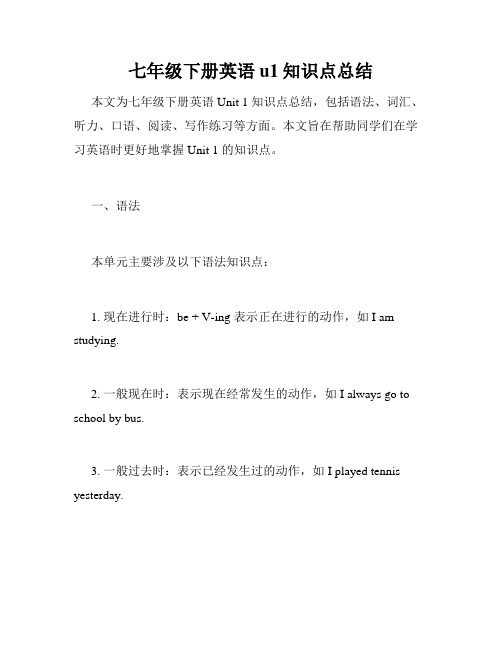
七年级下册英语u1知识点总结本文为七年级下册英语 Unit 1 知识点总结,包括语法、词汇、听力、口语、阅读、写作练习等方面。
本文旨在帮助同学们在学习英语时更好地掌握 Unit 1 的知识点。
一、语法本单元主要涉及以下语法知识点:1. 现在进行时:be + V-ing 表示正在进行的动作,如 I am studying.2. 一般现在时:表示现在经常发生的动作,如 I always go to school by bus.3. 一般过去时:表示已经发生过的动作,如 I played tennis yesterday.4. 频度副词:always, usually, often, sometimes, seldom, hardly ever, never 等词汇,用于描述动作的发生频率,如 I always get up early.5. 表示时间的介词:in, on, at 等词汇,如 I go to school at 7:30 every morning.二、词汇本单元重点词汇:1. weekdays:工作日2. at the moment:此刻3. have lunch:吃午饭4. after school:放学后5. play basketball:打篮球6. go shopping:购物7. twice a week:每周两次8. every day:每天9. get up:起床10. study for:为……而学习三、听力本单元听力主要涉及日常活动的描述和时间的表达,需要同学们在听力练习中注意抓住关键词,理解句子意思。
同时,也需要注意练习听力的技巧,例如做题前先看选项,根据上下文猜测单词意思等。
四、口语本单元口语练习主要针对日常活动的提问和回答,需要同学们熟悉常用词汇和句型,例如 What do you usually do after school? I usually play basketball. 同时,也需要注意语音、语调等细节问题,提高口语表达的准确性和自然度。
表示时间和频率的短语与频率
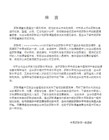
3)Nancy was up early. 南希很早就起来了。
4)He has just had an operation. 他刚动过手术。
分析:
句1)中的presently (shortly)(不久,一会儿),强调从现在算起到将来的某一时刻,时间持续很短;句2)中的finally(最终)强调事件的最终结果;句3)中的early(早)表示动作发生的时间比通常所认定的时间早;句4)中的just表示从过去的某个时间算起到现在,时间持续很短。
3. 其他一些表示时间的副词:
主要有:already, early, finally, first, immediately, just, late, long, presently, shortly, since, soon, yet等。例如:
1)I’ll be back presently(shortly). 我一会儿就回来。
3) Heree years before. 他说他父亲三年前去世了。
分析:
句1)中的so far(到目前为止)是副词短语,表示到现在为止的时间段;句2)中的the day after tomorrow(后天)表示事件将要发生的时间;句3)中的three years before(三年前)表示过去某件事发生的时间,用于间接引语中。选择最合适的选项完成句子。
3)He always arrives on time in time of an appointment. 约会时他总是很准时。
3. 带有介词at的时间短语:
at a time(在某时), at a wedding(婚礼), at all times(一直), at any moment, at Christmas, at dark (天黑时), at dawn(在黎明), at daybreak, at dinner-time, at dusk(在黄昏), at first sight, at first, at last, at night, at nightfall, at noon, at present, at six o’clock, at sunrise, at sunset, at that moment, at that time, at the age of, at the beginning of , at the end of, at the last minute, at the moment, at the same time, at the stage(眼下), at the start, at this point(此时), at this sea-son, at times(有时)等。例如:
Unit 4 重要语法精讲 (时间介词 频度副词) 七年级上册英语单元核心知识(牛津译林版)

in 2023 in June in autumn in the morning/afternoon/evening
01 时间介词in/on/at
on用于
星期 某一天 某一天的早中晚夜 被天气、季节等修 饰的早中晚夜 还有Day的节日
on Sunday on September 10th on the afternoon of Jnue 1st on a summer morning on a cold night on Children’s Day
1. There is a lot of snow _i_n___ winter. 2. Tom uaually have a rest __a_t __ noon. 3. We have a party _o_n___ the afternoon of June 1st. 4. Is your birthday _/____ this Friday? 5. —What‘s the time now?—It’s /____ 13 o’clock. 6. We meet _o_n___ a sunny morning.
04 随堂练习 填写适当的时间介词in/on/at,不需要介词的用“/”表示
6. Do you visit your grandparents _a_t__ the Spring Festival. 7. Tina often gets up _a_t___ half past six. 8. —What day is today? —It’s _/____ Monday. 9. She is going to Shanghai __o_n__ the morning of Mar. 13. 10. I have a PE lesson _o_n___ Tuesday afternoon.
副词用法总结
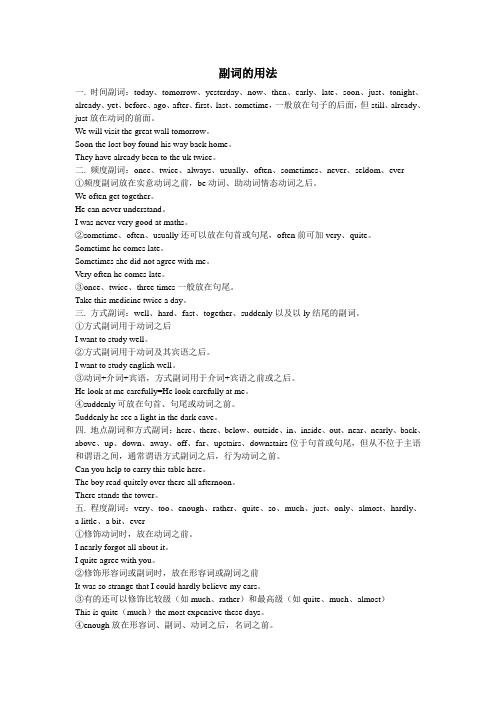
副词的用法一. 时间副词:today、tomorrow、yesterday、now、then、early、late、soon、just、tonight、already、yet、before、ago、after、first、last、sometime,一般放在句子的后面,但still、already、just放在动词的前面。
We will visit the great wall tomorrow。
Soon the lost boy found his way back home。
They have already been to the uk twice。
二. 频度副词:once、twice、always、usually、often、sometimes、never、seldom、ever①频度副词放在实意动词之前,be动词、助动词情态动词之后。
We often get together。
He can never understand。
I was never very good at maths。
②sometime、often、usually还可以放在句首或句尾,often前可加very、quite。
Sometime he comes late。
Sometimes she did not agree with me。
Very often he comes late。
③once、twice、three times一般放在句尾。
Take this medicine twice a day。
三. 方式副词:well、hard、fast、together、suddenly以及以ly结尾的副词。
①方式副词用于动词之后I want to study well。
②方式副词用于动词及其宾语之后。
I want to study english well。
③动词+介词+宾语,方式副词用于介词+宾语之前或之后。
He look at me carefully=He look carefully at me。
牛津七上Unit4表示时间的介词和频度副词讲解
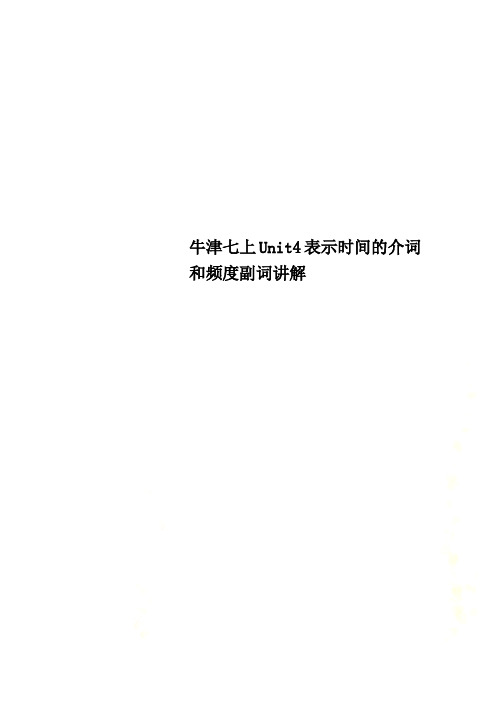
牛津七上Unit4表示时间的介词和频度副词讲解After lunch, I always need a good rest. 午饭后,我通常需要好好休息。
I usually go to school at 7:30. 我通常7:30去上学。
【用法讲解】1. in的用法1)用于一天的早、中、晚前。
例如:We have English class in the morning. 我们早上上英语课。
My mother goes to work in the afternoon. 我妈妈下午去上班。
She watches TV in the evening.她晚上看电视。
2)用于月份、季节、年份前。
例如:The flowers come out in spring. 花在春天绽放。
The Children’s Day is in May. 儿童节在五月。
They came to China in 2019. 他们在2019年来到了中国。
2. on的用法。
1)用于星期前。
例如: We go to school on Monday. 我们周一去上学。
2) 用于某一天前。
例如:School begins on September 1st. 学校9月1日开学。
3)用于某一天的早中晚前。
例如:She came to see us on a cold morning.她在一个寒冷的早晨来看我们。
4)特定的节日(一天)前。
We send some flowers to our teachers on Teachers’ Day.教师节我们送老师一些花。
【注意】如果节日不止一天,我们用at。
例如:at Christmas 在圣诞节3. at的用法。
1)用于某一时刻前。
例如:The train leaves at 7o’clock. 火车7点整开。
2)用于年龄前。
例如:She became a doctor at 23 years old. 她23岁时成为了一名医生。
副词和介词

三、方式副词
1. 方式副词的特点 方式副词表示动词的行为方式,许多以-ly结构的副词都是方式副词,如 carefully, happily, quietly, heavily, warmly, correctly, politely, angrily 等。 2. 方式副词在句中的位置 (1) 方式副词通常位于动词(及其宾语)之后: He read the letter slowly. 他从容不迫地看了那封信。 方式副词通常不位于动词与宾语之间,除非动词后的宾语很长: 不可说:We like very much it. (应改为We like it very much.) 但可说:We could see very clearly a strange light ahead of us. 我们可以很清楚地看到在我们前方有一道奇怪的光。 若遇到“动词+介词+宾语”结构,方式副词既可位于“介词+宾语”之前, 也可位于“介词+宾语”之后,但是若该结构的宾语较长,则方式副词通常 位于“介词+宾语”之前: He looked at me curiously. / He looked curiously at me. 他好奇地打量着我。 He looked curiously at everyone who got off the plane. 他好奇地打量着从飞机上走下来的每一个人。
二、地点副词
1. 常见的地点副词 常见的地点副词有here, there, up, down, away, nearby, home, ahead, abroad, indoors, overseas, halfway, upstairs, downstairs 等。 2. 地点副词在句中的位置 地点副词在句中通常位于句末或句首,但从不位 于主语和谓语之间。若有多个副词排列,地点副 词通常位于方式副词之后,时间副词之前: Can you help to carry this table upstairs? 你能帮 忙把桌子搬到楼上去吗? The boy read quietly over there all afternoon. 这 男孩整个下午都在那儿静静地看书。
初中英语语法精讲:常考副词用法归纳11
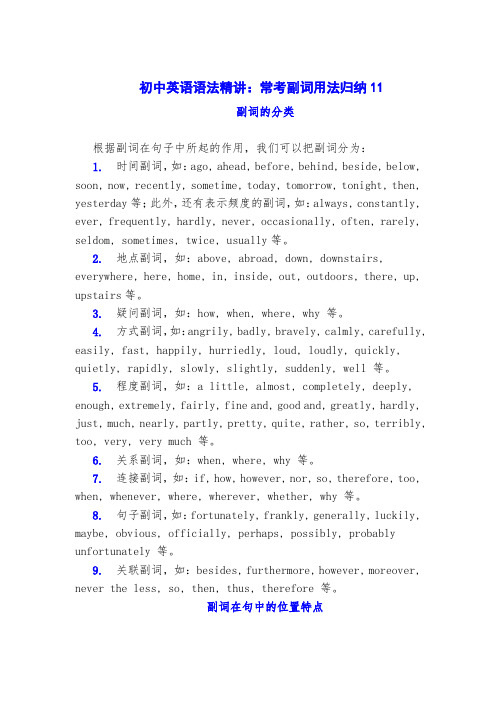
初中英语语法精讲:常考副词用法归纳11副词的分类根据副词在句子中所起的作用,我们可以把副词分为:1.时间副词,如:ago, ahead, before, behind, beside, below, soon, now, recently, sometime, today, tomorrow, tonight, then, yesterday等;此外,还有表示频度的副词,如:always, constantly, ever, frequently, hardly, never, occasionally, often, rarely, seldom, sometimes, twice, usually等。
2.地点副词,如:above, abroad, down, downstairs, everywhere, here, home, in, inside, out, outdoors, there, up, upstairs等。
3.疑问副词,如:how, when, where, why 等。
4.方式副词,如:angrily, badly, bravely, calmly, carefully, easily, fast, happily, hurriedly, loud, loudly, quickly, quietly, rapidly, slowly, slightly, suddenly, well 等。
5.程度副词,如:a little, almost, completely, deeply, enough, extremely, fairly, fine and, good and, greatly, hardly, just, much, nearly, partly, pretty, quite, rather, so, terribly, too, very, very much 等。
第03讲 时间介词和频度副词(解析版)七年级英语上册

第03讲时间介词和频度副词模块一思维导图串知识模块二基础知识全梳理(吃透教材)模块三教材习题学解题模块四核心考点精准练模块五小试牛刀过关测1.掌握时间介词in on at2.掌握频率副词never seldom sometimes often usually always时间介词用法例子at 表示时刻、时间的某一点at nine (o'clock) 在九点[来源:Z+xx+]atnoon 正午时on 用于某天,某一天的上、下午on Monday 在周一on June 6 在6月6日[来源:学+科+网Z+X+X+K] on a cold night 在一个寒冷的夜晚in 用于表示周、月、季节、年,泛指的上午、下午、晚上in M ay 在五月 in the morning in spring 在春季 in 2010频度副词用法副词的一种,通常和一般现在时连用,表示现在经常或反复发生的动作。
按照频率的高低依次为always(总是)>usually(通常)>often(经常) >sometimes(有时)>seldom(很少) >never(从不)位置实义动词之前,系动词be、助动词或情态动词之后一、时间介词at, in on1. 表示年、月、日、时刻等用 at, on, ina) at 用于表示时刻、时间的某一点:at nine (o'clock) 在九点at noon正午时b) on 用于某天,某一天的上、下午:on Monday 在周一 on June 6 在6月6日on May 4, 1996 在1996年5月4日 on a cold night 在一个寒冷的夜晚on the night of July 1st 在七月一日的夜晚注意:*指具体的某一天时,一律用on泛指一般的上午(下午)时用in,但特指某日的上午(下午)时用on:in the morning 在早上 on Sunday morning 在周日早上在重大节日前也可用on:on Christmas Eve 在圣诞前夜 on New Year's Day 在元旦c) in 用于表示周、月、季节、年,泛指的上午、下午、晚上:in this week 在这周in May 在五月in spring 在春季 in 2010 在2010年 in September, 1995 在1995年9月1.(23-24七年级上·江苏常州·期末)We will celebrate Chinese New Year’s Eve ______ Friday, February 9 this year.A.on B.at C.in D.to【答案】A【详解】句意:今年我们将在2月9日星期五庆祝中国新年前夜。
时间介词的用法总结

时间介词的用法总结介词是英语语法中的一类虚词,用来连接名词、代词或动词短语与其他词或短语的词,以表示它们之间的关系。
时间介词就是用来表示时间关系的介词,包括表示具体时间、时间段、频率、顺序等方面的介词。
本文将对时间介词的用法进行总结,包括时间介词的分类、使用方法和注意事项。
一、时间介词的分类根据时间介词表示的时间关系不同,可以将时间介词分为以下几类:1.表示具体时间点的介词:at2.表示时间段的介词:in, on, during, for, since3.表示顺序的介词:before, after, until, by4.表示频率的介词:in, on, at二、时间介词的使用方法1.表示具体时间点的介词at是表示具体时间点的介词,通常用来表示钟点、节日、特定时刻等时间点。
例如:at 7 o'clock, at Christmas, at noon等。
注意:at用于具体的时间点,表示某时某刻的时间点。
2.表示时间段的介词(1)in:通常用来表示较长的时间段,如年、月、季节等。
例如:in 2022, in January, in summer等。
也可用来表示将来的时间。
例如:I will see you in ten minutes.(2)on:通常用来表示某一天或具体日期。
例如:on Monday,on my birthday等。
(3)during:用于表示在整个时间段内进行的动作或事件。
例如:during the meeting, during the holidays等。
(4)for:用来表示持续的时间段。
例如:for two hours, fora week等。
(5)since:用来表示自从某个时间点开始一直持续到现在的时间段。
例如:since 2010, since I was a child等。
注意:since引导的时间段要使用现在完成时态。
3.表示顺序的介词(1)before:表示在某个时间点之前。
初中英语语法知识点:介词.数词.句型
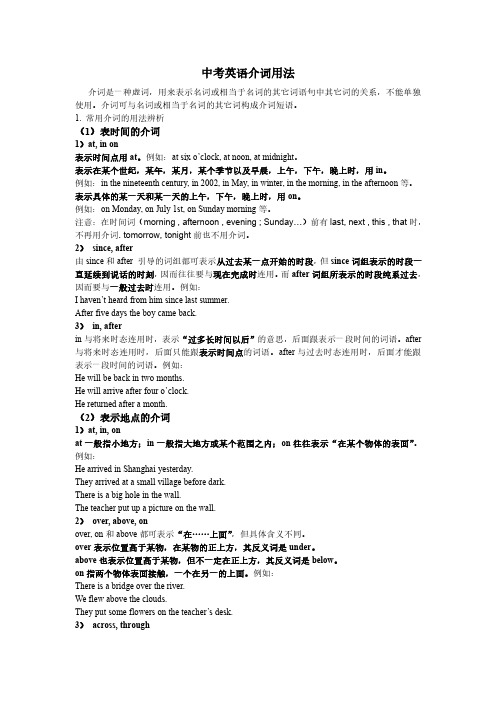
His grandpa still lives in this small short house. 他爷爷还住在这个矮小的房子里。
--- Three, please.(作宾语)
The nine boys are from Tianjing.(定语)
Six plus four is ten.(表语) We four will go with you.(同位语) (2) 表示一个具体数字时,hundred, thousand, million 一律不用复数;在表示 一个不确定数字时则用复数。例如: Our country has a population of 1,300 million people. There are three thousand students in our school. After the war, thousands of people became homeless. Maize is the most important food crop for millions of people in the world. They arrived in twos and threes. (3) 表示“……十”的数词的复数形式可用来表示人的岁数或年代,例如:
c. 主语+谓语+倍数(分数)+ 形容词(副词)比较级+ than…
The grain output is 8 percent higher this year than that of last year. 今年比去年粮食产量增加 8%。
d. 还可以用 by+倍数,表示增加多少倍 The production of grain has been increased by four times this year. 今年粮食产量增加了 4 倍。
时间介词in、on、at与常用频度副词的用法归纳
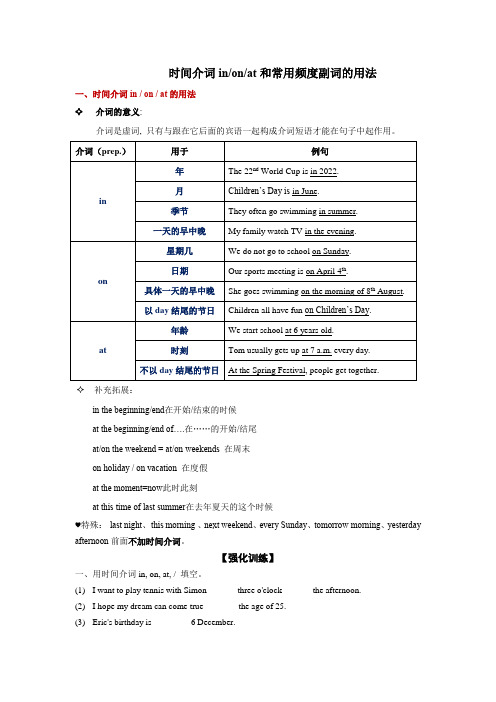
时间介词in/on/at和常用频度副词的用法一、时间介词in / on / at的用法✧介词的意义:介词是虚词, 只有与跟在它后面的宾语一起构成介词短语才能在句子中起作用。
✧补充拓展:in the beginning/end在开始/结束的时候at the beginning/end of….在……的开始/结尾at/on the weekend = at/on weekends 在周末on holiday / on vacation 在度假at the moment=now此时此刻at this time of last summer在去年夏天的这个时候♥特殊:last night、this morning、next weekend、every Sunday、tomorrow morning、yesterday afternoon前面不加时间介词。
【强化训练】一、用时间介词in, on, at, / 填空。
(1)I want to play tennis with Simon_______three o'clock_______the afternoon.(2)I hope my dream can come true________the age of 25.(3)Eric's birthday is_________6December.(4)He had a picnic________last Saturday.(5)Tom often watches TV __________ Saturday evenings.(6)His mother came to Nanjing _________ the morning of July 2nd.二、单项选择。
(1)--When is your birthday?--I was born ______ December 17. This year I’ll hold a birthday party for it at home.A. onB. atC. inD. by(2)--When will our guests arrive at the airport?-- _____ the evening of this Saturday.A. AtB. OfC. InD. On(3)I met a famous singer________ a cold evening ______ last year.A. on; inB. in; onC. in;/D. on;/二、频度副词的用法1.定义:频度副词来表示做某事的频率。
初中英语中考语法复习副词知识点
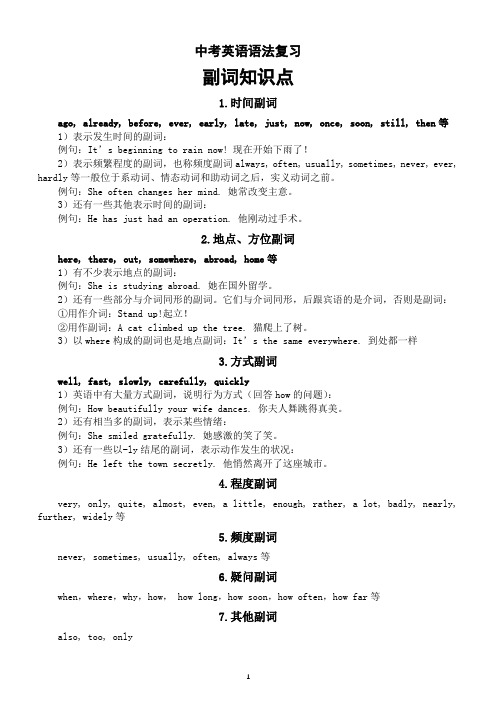
中考英语语法复习副词知识点1.时间副词ago, already, before, ever, early, late, just, now, once, soon, still, then等1)表示发生时间的副词:例句:It’s beginning to rain now! 现在开始下雨了!2)表示频繁程度的副词,也称频度副词always, often, usually, sometimes, never, ever, hardly等一般位于系动词、情态动词和助动词之后,实义动词之前。
例句:She often changes her mind. 她常改变主意。
3)还有一些其他表示时间的副词:例句:He has just had an operation. 他刚动过手术。
2.地点、方位副词here, there, out, somewhere, abroad, home等1)有不少表示地点的副词:例句:She is studying abroad. 她在国外留学。
2)还有一些部分与介词同形的副词。
它们与介词同形,后跟宾语的是介词,否则是副词:①用作介词:Stand up!起立!②用作副词:A cat climbed up the tree. 猫爬上了树。
3)以where构成的副词也是地点副词:It’s the same everywhere. 到处都一样3.方式副词well, fast, slowly, carefully, quickly1)英语中有大量方式副词,说明行为方式(回答how的问题):例句:How beautifully your wife dances. 你夫人舞跳得真美。
2)还有相当多的副词,表示某些情绪:例句:She smiled gratefully. 她感激的笑了笑。
3)还有一些以-ly结尾的副词,表示动作发生的状况:例句:He left the town secretly. 他悄然离开了这座城市。
英语中表示时间的副词和短语的归纳

英语中表示时间的副词和短语的归纳(小芳)英语中表示时间的词语主要分为以下几类:时间点、时间段、动作发生的频度、动作或事件发生的先后。
一般可用单个副词来表示,也可以用带有介词in、at、on和for的短语来表示。
此外,一些不带介词的短语也可以用来表示动作(事件)发生(状态持续)的时间。
一、单个副词表示时间1. 表示动作(事件)发生的时间这类副词常见的有:ago, before, lately, later (on), now, recently, then, today, tomorrow, tonight, yesterday等。
例如:1) It’s beginning to rain now! (时间点) 现在开始下雨了!2) I haven’t seen her recently. (时间段) 最近我没见到她。
3) Will you be free tonight? (时间段) 你今晚有空吗?4) See you later. (时间点) 回头见。
2. 表示频度这类副词常见的有:always, constantly, continuously, continually, ever, frequently, generally, hardly ever, much, never, normally, occasionally(偶尔), often, periodically(定期地,偶尔), rarely, regularly, repeatedly, seldom(很少), sometimes, usually, now and then(偶尔,有时)等。
例如:1) Tom is constantly changing her mind. (频度副词constantly)汤姆老是改变主意。
2) They do meet now and then, but not regularly. (频度副词regularly)他们确实偶尔也见面,但不经常。
英语中表示时间的词

英语中表示时间的词语英语中表示时间的词语主要分为以下几类:时间点、时间段、动作发生的频度、动作或事件发生的先后。
一般可用单个副词来表示也可以用带有介词in aton 和for 的短语来表示。
此外一些不带介词的短语也可以用来表示动作事件发生状态持续的时间。
一、单个副词表示时间1. 表示动作事件发生的时间这类副词常见的有:ago before lately later on now recently thentoday tomorrow tonight yesterday 等。
例如:1It’s beginning to rain now 时间点现在开始下雨了!2I haven’t seen her recently. 时间段最近我没见到她。
3Will you be free tonight 时间段你今晚有空吗?4See you later. 时间点回头见。
2. 表示频度这类副词常见的有:always constantly continuously continually everfrequently generally hardly ever much never normallyoccasionally偶尔often periodically定期地偶尔rarely regularlyrepeatedly seldom很少sometimes usually now and then偶尔有时等。
例如:1She is constantly changing her mind. 频度她老是改变主意。
2We do meet now and then but not regularly. 频度我们确实偶尔也见面但不经常。
3Lester rarely left his room. 频度莱斯特很少离开他的房间。
3. 其他一些表示时间的副词:主要有:already early finally first immediately just late longpresently shortly since soon yet 等。
出现表示频率副词或时间状语的英语单词

出现表示频率副词或时间状语的英语单词频率副词或时间状语是用于描述动作或事件发生的频率或时间的词语。
以下是一些常见的频率副词和时间状语:1. Always -指每次都发生,总是发生。
Example: She always accompanies me to the train station.2. Often -指经常发生,经常进行。
Example: I often go to the gym in the morning.3. Sometimes -指发生的概率比较低,有时发生。
Example: Sometimes, I like to watch movies on weekends.4. Rarely -指发生的概率非常低,很少发生。
Example: I rarely eat fast food because it's unhealthy.5. Never -指没有出现过,从来没有发生。
Example: I have never been to Paris.6. Daily -每天,每日。
Example: He goes for a run daily in the morning.7. Weekly -每周,每星期。
Example: They have a team meeting weekly on Mondays.8. Monthly -每月。
Example: We send out invoices to clients monthly.9. Yearly -每年。
Example: The company holds a big event yearly to celebrate its anniversary.10. Today -今天。
Example: I have a meeting with my boss today.11. Yesterday -昨天。
Example: I went shopping with my friends yesterday.12. Tomorrow -明天。
频度副词 与时间介词2

The end!!
Activity1:pair work
• How often do you go to karaoke? • I rarely go to karaoke. • (rarely, sometimes, never, always,
often)
Go shopping
dance
ride a bike
• • • • • • • • •
at 用于表示时刻、时间的某一点: at nine (o'clock) 在九点 at noon 正午时 at present目前 at six o'clock(在六点钟) at dawn(在黎明) at sunrise(日出时) at noon(在正午) at dusk(在黄昏)
时间的表达 ____频度副词与时间介词
Part1 Warm up
Do you often…?
drive a car
read
sing Play computer games
What ?
1.Mary ______ goes to her dancing lesson . rarely 2.She ______ plants tomatoes. usually always 3.She ______ wears a flower for her hair. often 4.She ______ plants roses and lilies. 5.She sometimeseats salads for breakfast . ______
我每周锻炼一次。
I eat KFC twice a month.
我一个月吃两次肯德基。
频度副词在句中的位置:
表示时间的介词和频度副词

111时间介词(at, in ,on) 的用法1. at(1)时间的一点、时刻等。
如:’clock.(at night, at noon, at midnight, at ten o’clock, at daybreak, at dawn).(2)后面接表示岁数的词。
(3)较短暂的一段时间。
可指某个节日或被认为是一年中标志大事的日子。
如:(at New Year, at the Spring Festival ).2. in(1内。
如:in 2004, in March, in spring, in the morning, in the evening, etc(2)在一段时间之后,常用于将来时。
He will arrive in two hours.These products will be produced in a month.3. on(1)具体的时日和一个特定的时间,如某日、某节日、星期几等。
如:On Christmas Day (On May 4th ), there will be a celebration.(2)在某个特定的早晨、下午或晚上。
如:He arrived at 10 o’clock on the night of the 5th.(3)准时,按时。
如:If the train should be on time, I should reach home before dark.表示频率的副词用法详解一、常见的频率副词always ,usually ,often ,sometimes , seldom ,never.1) always 表示的频率为100%,意思是"总是、一直、始终"。
I always do my cleaning on Sundays. 我总是在星期天搞卫生。
2)usually与always相比,表示的频率要低些,约为70%-80%。
频度副词及时间表达法

频度副词含义:表示次数,频率的副词称为频度副词.比如像usually,sometimes,always,often.位置:(1)在be动词之后,eg:she is sometimes very busy。
他有时很忙。
(2)在第一个助动词或情态动词之后,eg:I will never forget the first time I met you。
我永远不会忘记我们的第一次见面。
(3)在实意动词之前.We often go there.我们经常去那儿。
(4)sometimes可放在句首、句中或句末,often放在句中或句末。
Eg:sometimes she watches TV。
他有时看电视。
She watches TV often.用法:often,always,usually,等常和一般现在时连用,表示经常或反复发生的动作。
Eg:it often rains here。
·对频度副词的提问用how often.Eg;I sometimes write to my brother。
有时候,我写信给我的弟弟。
How often do you write to your brother?你多久给你弟弟写一次信?辨析:sometimes,some times,sometime,some timeSometimes,频度副词,意为“有时”Some times名词短语,意为“好多次,”“几倍'sometime副词意为过去或将来的某个时候Some time名词短语意为“一段时间”Eg:I sometimes play games with her。
我有时和他玩游戏.I have read the book some times.这本书我已经读了这本书好几遍了.Come to see us sometime。
找个时间来看我们。
I will stay here for some time。
我将在这儿呆一段按时间。
- 1、下载文档前请自行甄别文档内容的完整性,平台不提供额外的编辑、内容补充、找答案等附加服务。
- 2、"仅部分预览"的文档,不可在线预览部分如存在完整性等问题,可反馈申请退款(可完整预览的文档不适用该条件!)。
- 3、如文档侵犯您的权益,请联系客服反馈,我们会尽快为您处理(人工客服工作时间:9:00-18:30)。
时间介词(at, in ,on) 得用法
1.at
(1)时间得一点、时刻等。
如:
’clock、
(at night, at noon, at midnight, at ten o’clock, at daybreak, at dawn)、
(2)后面接表示岁数得词。
、
(3)较短暂得一段时间。
可指某个节日或被认为就是一年中标志大事得日子。
如:
、
2、 in
(1)在某个较长得时间()内。
如:
in 2004, in March, in spring, in the morning, in the evening, etc
(2),常用于将来时。
He will arrive in two hours、
These products will be produced in a month、
3、 on
(1)具体得时日与一个特定得时间,如某日、某节日、星期几等。
如:
On Christmas Day(On May 4th), there will be a celebration、
(2)在某个特定得早晨、下午或晚上。
如:
He arrived at 10 o’clock on the night of the 5th、
(3)准时,按时。
如:
If the train should be on time, I should reach home before dark、
表示频率得副词用法详解
一、常见得频率副词
always,usually,often,sometimes, seldom,never、
1) always表示得频率为100%,意思就是"总就是、一直、始终"。
I always do my cleaning on Sundays、我总就是在星期天搞卫生。
2)usually与always相比,表示得频率要低些,约为70%-80%。
意思就是"通常"。
Plants are usually green、植物通常就是绿色得。
Usually she goes to work by bus、她通常乘公共汽车去上班。
3)often得频率比usually又略低些,约为60%-70%,意思就是"经常"、"常常"。
Do you often write to them? 您常给她们写信吗?
Does Fred e here often? 弗雷德常来这儿吗?
4)sometimes得频率比often又低些,约为50%>sometimes>30%,意思就是“有时、不时”。
Jenny usually eats a sandwich for lunch、Sometimes she eats soup、
5)seldom 得频率比sometimes还要低些约为20%左右,意思就是“很少”。
My father was seldom at home on Sundays、我父亲星期天很少在家。
6)never与always完全相反,就是100%否定,意思就是“从不,决不,总就是不“。
I can never stop、我绝不会停止。
Li Ming never wears dresses、李明从不穿裙子。
I would never do anything to hurt him、我绝不会做任何伤害她得事情。
二、频率副词示意图
三、频率副词在句中得位置
通常频率副词放在行为动词之前, be动词,情态动词或助动词之后。
但就是sometimes最活跃。
它既可以在句中也可以在句首,还能在句末。
其它词如often 也可以放在句中也可以放在句末,这里就不一一列举了。
四、注意得问题
always得完全否定形式就是never,部分否定形式就是not always、例如:She always wears
a dress、她总穿裙子。
(改否定句)
1)She never wears a dress、她从不穿裙子。
(彻底否定)
2)She does not always wear a dress、她不总穿裙子。
(部分否定)
有如:The rich are not always happy、富有未必就是幸福得。
时间介词用法练习:
( ) 1、Children get gifts ____ Christmas and ____ their birthdays、
A、on; on
B、at; on
C、in; in
D、in; on
( ) 2、----There is nothing ____tomorrow afternoon, is there?
-----No、We can have a game of table tennis、
A、on
B、in
C、out
D、up
( ) 3、A lot of students in our school were born____March, 1981、
A、in
B、at
C、on
D、since
( ) 4、He suddenly returned____ a rainy night、
A、on
B、at
C、in
D、during
( ) 5、My grandfather was born____Oct、10, 1935、
A、on
B、in
C、at
D、of
( ) 6、The train is starting___five minutes、
A、in
B、at
C、for
D、still
( ) 7、Mike does his exercises ____ seven _____ the evening、
A、on; to
B、at; in
C、by; of
D、at; on
( ) 8、Children wake up very early____the morning of Christmas Day、
A、in
B、on
C、for
D、at
( ) 9 ____ a cold winter morning, I met her in the stfeet、
A、In
B、On
C、At
D、For
( ) 10 It happened to be very cold____ the morning of our sports meeting、
A、at
B、on
C、with
D、of
( ) 11、Why did you get up so early ___ this morning、
A、on
B、/
C、at
D、in
( ) 12、He went to Shanghai___ September 3, 1991 and came back___ a cold morning last year、
A、in; on
B、on; in
C、on; on
D、in; ia
( ) 13、Lucy was born____ the night of May 12, 1984、、、、、
A、on
B、in
C、at
D、to
( ) 14、Mrs Brown came to China ____ 1996、
A、on
B、of
C、to,
D、in
( ) 15 ___ the morning of November 20, 1915, the workers came to Chicago to show their mourning of Joe Hill、
A、On
B、In
C、On
D、At
( ) 16、Ann moved___Hangzhou___September, 1992、
A、/; in
B、to; in
C、to; on D, in; in
( ) 17、They started off___an autumn afternoon、
A、during
B、at
C、in
D、on
( ) 18、He often goes ____ school ____ six thirty ____ the morning、
A、for; to; in
B、to; at; in
C、to; for; at D, for; at; to
( ) 19、He arrived ___ Shanghai ___ 9: 30 ___ March 5、
A、at; in; at
B、to; on; at
C、in; on; at
D、in; at; on
( ) 20、The English teacher told me to get there____ half past ten、
A: in B、at C、on D、of。
